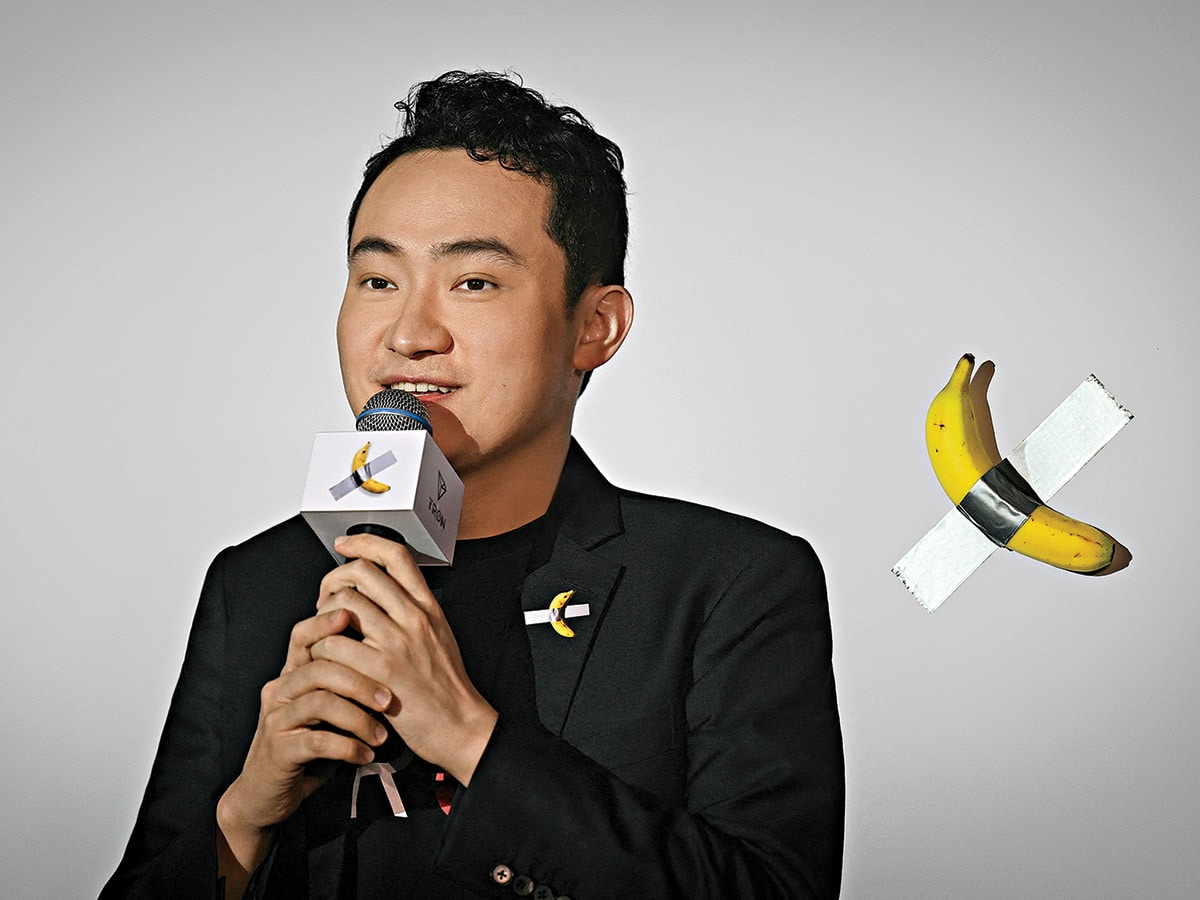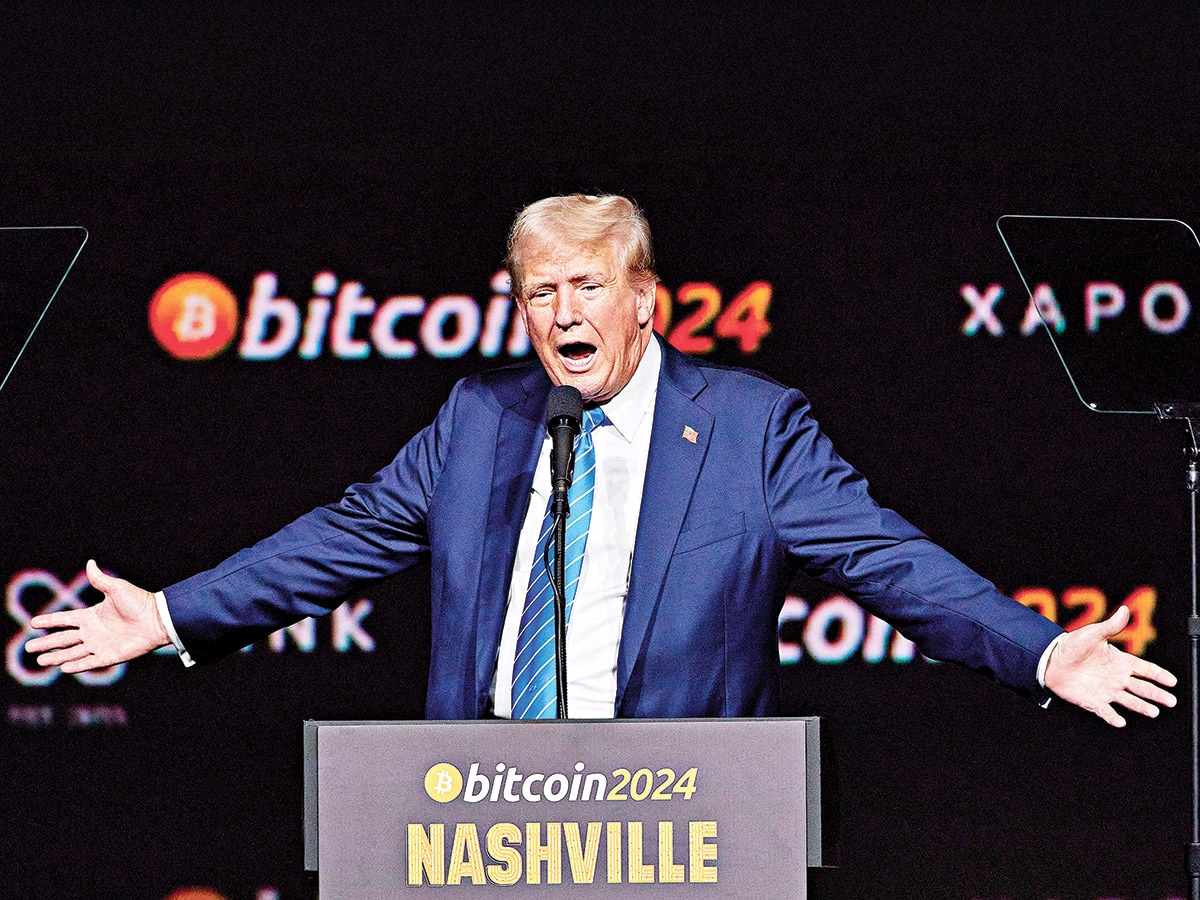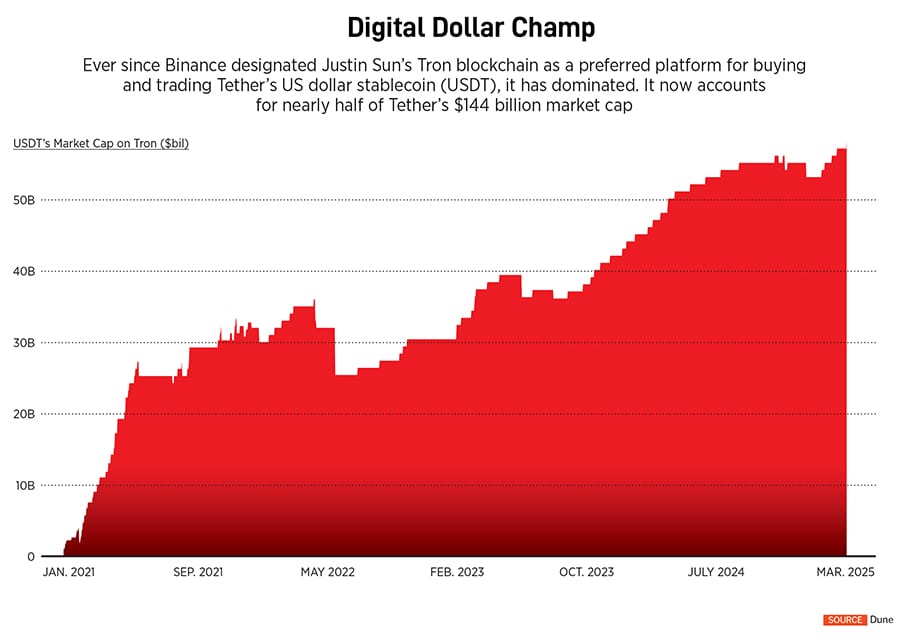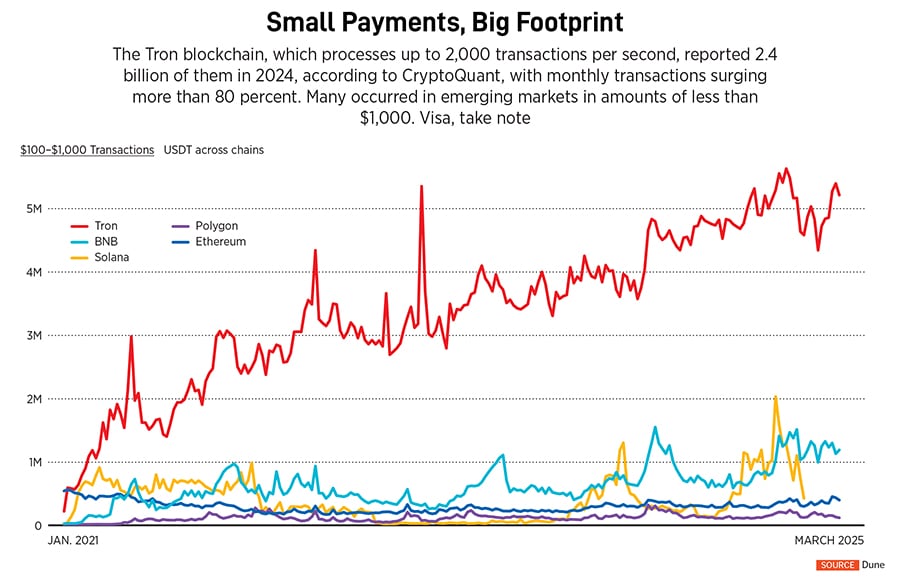The reality show did a lot more than teach him how to pronounce Trump’s “You’re fired!" catchphrase. The precocious Sun says he was captivated by the American tycoon’s lessons in cutthroat competition, showmanship and, of course, ego—anathema in a society steeped in the principles of Confucianism and Chinese socialism. But it was the early 2000s, and the reforms set in place by Deng Xiaoping had opened China to capitalism—especially in booming Shenzhen, which borders Huizhou. “It was natural for The Apprentice to become popular in China," Sun says.
So it felt like fate—perhaps now a four-letter word for opportunism—that Sun heard late last year that the Trump family’s crypto venture, World Liberty Financial (WLF), was faltering despite the fact that the patriarch, listed as the company’s “chief crypto advocate," had just been elected president of the United States.
It was easy to see why. World Liberty Financial’s so-called white paper (crypto’s version of a business plan) was dubbed “Gold Paper" and adorned with a portrait of Trump on its cover looking like a superhero and dripping gold. World Liberty was going to be another decentralised finance platform, of which there are hundreds already, but it offered no equity, lacked credible management and its tokens would be illiquid. The fact that the Trumps could have easily self-financed the $30 million needed to launch, but chose against it, underscored why no one else wanted to either. (Donald Trump more than three decades ago had pivoted his empire toward using other people’s money rather than risking his own.)
But the 34-year-old Sun couldn’t miss the potential dividend sitting in front of him. Since March 2023, Sun has been facing a Securities and Exchange Commission lawsuit alleging fraudulent market manipulation and selling unregistered securities. Now he had come across a way to single-handedly enrich the person about to lead the executive branch of the US government, the SEC included.
In late November, just three weeks after Trump’s election, Sun plunked down the $30 million ostensibly needed to cover operating expenses. “I see WLF as a strong player in the financial technology space," Sun says, unconvincingly. He’s more eloquent when discussing the idea of Trump as a one-man “cheat code" for crypto, “and then your development will be so much better than before."
![]() Banana Republican: No one in crypto has been more fruitful in converting outrageous stuntsinto a giant following and blockchain riches than Justin SunImage: Peter Parks / AFP
Banana Republican: No one in crypto has been more fruitful in converting outrageous stuntsinto a giant following and blockchain riches than Justin SunImage: Peter Parks / AFP
That $30 million ignited a buying frenzy that primarily benefits the Trump family. As if Sun’s actions weren’t helpful enough, a few weeks later he invested another $45 million into World Liberty Financial, 75 percent of which went directly into Trump’s pocket, per a disclosed stipulation that the Trump family takes three-quarters of everything raised above the initial $30 million. Then, when the president launched his meme coin, $TRUMP, in January, Sun invested a few million more. All told, Sun’s actions yielded a small return for him on paper—even worse, his entire position in WLF was locked up indefinitely—while generating an estimated $400 million windfall for the Trumps. (Taking note, Connecticut Senator Chris Murphy on the floor of the Senate in early March said that “this is essentially Trump posting his Venmo for anyone to secretly wire him as much money as they want.")
Sun’s tributes seemingly paid off. Almost immediately he was named an advisor to World Liberty. Then, in early 2025, after Trump took office, the SEC dropped virtually all of its lawsuits and investigations against alleged crypto violators, including exchanges Coinbase, Kraken and Robinhood. It would also “pause" its lawsuit against Sun and his firms.
![]()
Such is life for crypto’s most transactional billionaire. If you want an idealistic discourse on Satoshi Nakamoto’s promise of a new financial system governed by peers, outside the control of central banks and greedy tech giants, you won’t get it from Sun. He’s a pure opportunist. He has limited computer programming skills, and nearly all the entities he has created or controls have famously copied the business models of other first movers.
As of right now, it’s working. Ethereum was a crypto darling—a blockchain with functionality—so Sun created a faster and cheaper version, Tron, which now has a market cap of $22 billion. Watching the successes (and failures) of Binance and FTX, he bought cryptocurrency exchanges Poloniex, based in Panama, and HTX (formerly known as Huobi), which focused on Asia. And seeing Uniswap’s growth as a decentralised finance (DeFi) protocol, he created SunSwap.
Moving fast and copying things has made Sun extraordinarily rich, extremely fast. Like his childhood idol Trump, he apparently covets what Forbes says about his net worth and tells us his number exceeds $40 billion, including large holdings of cryptocurrencies like bitcoin and ether, as well as fine art including a Picasso and a Warhol, plus an Airbus 330 jet.
As with Trump, it’s hard to take anything Sun tells you at face value, at least when it comes to his holdings. He has a dizzying maze of wallets and keeps some of his assets in other people’s names. We applied sizable discounts to several of his claimed assets—such as the exchange HTX, where he says he stores a large amount of his personal cryptocurrency stash—and left out many of his smaller unverified holdings altogether.
But even given that large dose of skepticism, Forbes estimates Sun’s net worth at $8.5 billion, with an acknowledgement that it could be much larger. And with the SEC giving him a reprieve, that number is poised to surge.
![]()
Born in 1990 in the remote Qinghai province bordering Tibet, Sun moved with his family when he was four to bustling Guangdong. He was immersed in words. His mother was a sports journalist for Huizhou’s daily paper his father covered politics in Qinghai. Literature was his first love, inspired by the works of Chinese novelist Mo Yan, a Nobel laureate, and French philosopher Michel Foucault, whose writings explored how power defines and controls knowledge. In 2007, Sun won a national writing competition, securing a place at prestigious Peking University, where he initially set out to study literature and become an important writer. Once there, he switched his focus to global history. “Because of this, I see the world as a unified place," he says.
Like many ambitious Chinese students, he looked to the US for his next step. In 2011, he enrolled at Trump’s alma mater, the University of Pennsylvania, where he pursued a master’s in political economy. Then, in 2012, a New York Times article about Bitcoin changed everything. “People told me this is the money for the future and the internet," Sun recalls. He downloaded a Bitcoin wallet, a friend sent him some, and he was hooked. Days and nights disappeared into Bitcoin forums, where he devoured everything he could find on the emerging technology.
![]() Presidential Profiteer: Despite a disdain for Bitcoin during his first term, Trump 2.0 wants to make the US the “undisputed Bitcoin superpower and crypto capital of the world". With his meme coin and a DeFi platform in which any person or entity can invest directly without disclosure, Forbes estimates the President and his family may have already reaped $575 million from cryptoImage: Ohnnie Izquierdo/The Washington Post/Getty Images
Presidential Profiteer: Despite a disdain for Bitcoin during his first term, Trump 2.0 wants to make the US the “undisputed Bitcoin superpower and crypto capital of the world". With his meme coin and a DeFi platform in which any person or entity can invest directly without disclosure, Forbes estimates the President and his family may have already reaped $575 million from cryptoImage: Ohnnie Izquierdo/The Washington Post/Getty Images
One of those forums led him to Stefan Thomas, then-CTO of Ripple Labs, which was attempting to build a decentralised alternative to global bank messaging network SWIFT. Ripple’s XRP cryptocurrency aimed to serve as a bridge between global fiat currencies, requiring a network of gateways in different countries. In 2013, Thomas asked Sun to become Ripple’s chief representative to China.
Pretty good for someone still in his early 20s, but from the beginning Sun ruffled feathers. “He always said he had connections to the Chinese Communist Party and the government, but to be honest, I don’t think any of those connections were helpful at all," recalls a former colleague at Ripple who requested anonymity. “Imagine an early-stage startup, and here comes Justin—Prada shoes, Gucci shirt. He is money-hungry. You could tell he was going to do whatever it took to be wealthy."
Not long after Sun joined Ripple, Ethereum, a blockchain that supported more advanced functions thanks to smart contracts, became the new rage. Sun invested in Ethereum’s 2014 ICO but ultimately came to believe that, even as it processed transactions much faster than Bitcoin, it remained too slow. Ripple, on the other hand, wasn’t succeeding at integrating smart contracts. That’s when lightning struck: a new blockchain with the speed of XRP and smart contracts. “We needed something cheaper and faster but with Ethereum compatibility," says Sun, who left Ripple in 2015 and launched Tron two years later.
From its inception, Sun’s new blockchain was dogged by allegations that its white paper plagiarised the documentation of Ethereum and another blockchain. Juan Benet, founder of Protocol Labs, the team behind the data-storage blockchain Filecoin, alleged in a 2018 tweet that Tron’s paper lifted nine pages directly from his white paper. Vitalik Buterin, the Russian-born Canadian co-founder of Ethereum, trolled Sun, writing a 2018 response to a Sun tweet listing differences between Ethereum and Tron. “Better white paper writing capability: (Control+C + Control+V much higher efficiency than keyboard typing new content)."
Undeterred, Sun insisted that the similarity to Ethereum was intentional. “At that time, Ethereum compatibility was very important," he says.
No one has been more instrumental to Sun’s early success than Changpeng “CZ" Zhao, Binance’s billionaire founder, whom Sun says he first met in 2015 while he was still at the predecessor to Blockchain.com. In August 2017, Binance handled Tron’s $70 million ICO just a few days before China banned the speculative offerings outright.
![]()
In November 2018, after the ICO bubble had burst, Zhao launched Binance’s Gold Label Project in an effort to support floundering crypto offerings and “raise the industry standard for quality of information" by encouraging the projects to post regular updates on their development. Tron was one of the first to receive that blessing, and because Tron became the default option for Binance’s 10 million users who wanted to use Tether’s USDT stablecoin for US dollar payments, its business swelled. In late 2019, Binance juiced Sun again, offering holders of Tether’s stablecoin on Tron a 16 percent annual percentage rate on balances. It also quietly began offering free withdrawals and internal transfers, which gave Tron a big competitive edge over Ethereum transfers. According to research from Messari, from October to December 2019, the supply of Tether’s USDT coin on Tron jumped from around $100 million to almost $1 billion, representing around 30 percent of the stablecoin supply at the time.
CZ and Binance were headed for trouble—in 2023 Binance agreed to pay over $4 billion to the US government in response to money laundering and other charges. In mid 2024, CZ served four months in prison after he pleaded guilty to failing to maintain an effective anti–money laundering program. But Binance’s boost for Tron had already taken: Tether’s USDT has become the most actively traded cryptocurrency on the planet, and Tron has become its main blockchain home. Part of it is liquidity: People and businesses in emerging countries are desperate for dollars to facilitate trade and payments. They use Tether’s digital dollar as a substitute. In fact, Tron already has 300 million users worldwide and its monthly transaction volume exceeds $500 billion, making it indispensable for peer-to-peer payments.
![]()
“Any time I refer to stablecoins, you can just assume that about 70 percent of it is USDT on Tron," says Chris Maurice, a Forbes 30 Under 30 honoree and the co-founder and CEO of Yellow Card, which specialises in payments and remittances in 20 African countries.
Low fees have been another driver for Tron. Sun gobbled up market share by offering trades at 30 cents at a time when Ethereum charged $50. “You’re talking about some of the most cost-sensitive markets on earth," Maurice says. “In some of these countries people will spend eight hours of their day to save a couple of bucks, and $50 versus a few cents is a pretty tremendous difference."
USDT boasts a circulation of $144 billion Tron accounts for almost half of it. Its dominance established, Tron’s fees have jumped at least tenfold. In 2024, Tron’s blockchain revenue of $2.2 billion was second only to Ethereum’s at $2.5 billion.
Rapid growth in the Wild West of crypto: What could go wrong? Well, the same features that make USDT on Tron appealing to legitimate users have attracted terrorists, drug dealers, money launderers and scammers. Blockchain intelligence firm Inca Digital found that terrorist organisations including Hamas and Hezbollah have used Sun’s blockchain to move more than $2 billion in funds. According to TRM Labs’ Crypto Crime report, 58 percent of all illicit crypto transactions last year, almost $10 billion, occurred on Tron—more than Ethereum and Bitcoin combined.
Sun claims he’s working to make Tron safer. In September, Tron, Tether and TRM Labs announced a partnership to root out illicit activity on Tron, called the T3 Financial Crime Unit. Since its launch T3 says it has frozen $130 million.
![]()
For the most part, those in the United States seem skeptical. Stablecoin maker Circle has stopped doing business with Sun’s blockchain altogether. Moreover, in December 2024, blue-chip exchange Coinbase delisted a version of bitcoin known as “wrapped bitcoin" (wBTC) that runs on the Ethereum blockchain and is widely rumored to be controlled by Sun. Said Coinbase in a court filing over the matter, “Mr. Sun’s affiliation with—and potential control over—wBTC presented an unacceptable risk to its customers and the integrity of its exchange." Sun declined to comment on the matter.
The SEC charges, though on hold, are serious. Sun and the foundations he allegedly controls, Tron and BitTorrent, were not only accused of selling unregistered securities but also of propping up his blockchain’s token, TRX, through bogus “wash" trading in 2018 and 2019. Sun allegedly directed his employees to set up multiple accounts and make hundreds of thousands of trades, giving the appearance of heavy demand. The SEC also alleges that Sun further pumped up his token’s price by paying celebrities including Lindsay Lohan and Jake Paul to tout them, without disclosing the payments. (Sun declined to comment on the SEC’s lawsuit.)
All of which makes the timing of the Trump partnership all the more convenient. While Sun says he has never met the President, he has recently spent time with sons Eric and Donald Jr, who are partners in WLF with the son of Trump’s friend and Middle East envoy Steve Witkoff.
Fully aware that crypto requires public trust, Sun has latched himself to the idea that the President of the United States, in jumping into this market, can enhance its credibility among retail investors. “$TRUMP really breaks the boundaries between Web3 and the traditional world," Sun says. “Even my mom asked me about the token."
“I think Trump got elected and started to push lots of crypto business, [which] actually benefits the whole industry a lot more in this supercycle," he adds. He cites the global reaction to $TRUMP after it launched, claiming that his exchange, HTX, registered 1 million new users within a week of Trump’s coin offering, many of whom came from China, where crypto is technically banned. Even more telling, according to Sun, was that Chinese authorities let the meme coin trend on social media for days.
“The Chinese government doesn’t want to be seen as banning Trump," he says. “I think they are afraid of somebody telling Trump that the Chinese government is banning your coin."
Sun might not have met Trump, but he has embodied the lessons of America’s greatest marketer. While many crypto leaders crave anonymity, Sun has embraced the opposite, eagerly throwing millions at stunts that catch the public eye.
In 2019, he paid $4.6 million to have lunch with Warren Buffett as part of Buffett’s annual charity auction. That attracted attention. Then Sun compounded it by canceling three days before the planned meetup. (He ultimately dined with Buffett in Omaha, Nebraska, a year later.) Sun ran that playbook again in 2021, bidding $28 million to be the first paying passenger on Jeff Bezos’ spaceship Blue Origin, then garnering still more attention by missing the launch because of “scheduling" conflicts.
In November, as he was finalising his Trump investment, Sun spent $6.2 million at Sotheby’s for a work of conceptual art: The Comedian, a banana duct-taped to a wall by Italian artist Maurizio Cattelan. Ten days later he ate the banana onstage in front of a group of reporters in Hong Kong.
He identifies himself with the title “His Excellency," owing to his recent World Trade Organization ambassadorship of the tiny Caribbean island of Grenada. He also holds the position of prime minister of the Free Republic of Liberland, a “micronation" claiming ownership of territory along the Danube River in Croatia. So what does His Excellency, a Chinese native—who in addition to these dubious posts seems to spend most of his time in Hong Kong and lists his location as Switzerland on his X profile—consider as his citizenship? “I think we can put St. Kitts, probably," he says.
“Most people probably think I do these things because I want to get everybody’s attention," he says. “But actually, when I do things in crypto that come to reality, that is when I get most of it."
Indeed, such theatrics distract from what seems a very cunning growth focus. His copycat DeFi exchange SunSwap, built on the Tron blockchain, saw its trading volume explode in 2024, using the low intro-fee strategy he employed for USDT, with more than $4 billion of trades of the “wrapped" token in December 2024. Likewise SunPump, Sun’s copy of the Solana-based meme coin factory, is churning out the trendy whimsical tokens at a rapid rate. Though the 97,000 tokens it has minted since inception in August have produced only $37 million—compared to Solana’s 2024 total of $600 million—Sun believes Asia is the next big market for meme coins, and he’s positioning SunPump to be a leader.
“I think meme coins are capitalising the internet itself," he says.
So what’s next? “These days, I’m thinking about AI agents," says Sun, who, ever the bandwagon jumper, now cites Elon Musk as his chief role model. He wants Tron, with its fast transactions, to serve as the underlying payments infrastructure for a world powered by intelligent machines.
“For example, if you need to get a job done and one AI agent hires another, which hires ten more within a minute, that’s impossible in the traditional systems, where you need payroll, bank accounts. That’s gonna take probably six months to do it in the first place," Sun says. “But on a highly scalable network everything can be done in five minutes or five seconds, and that’s going to make a lot of things possible. Think global AI employment—and of course a global reliable payment network operating 24/7 is a foundation for that."
Sounds crazy? That’s just fine by Sun, who relishes the attention, is used to being underestimated and seems unruffled by the perceived impunity that his partnership with the Trumps may or may not have purchased.
“Regulators have a mindset that everybody needs to comply. But most regulations are from the past and are being used to regulate future activities," Sun says. “I want to be a builder of the future world. But first, we have to imagine what the future world will be."
Additional reporting by Javier Paz.







